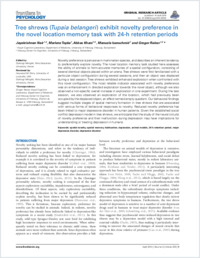Tree shrews (Tupaia belangeri) exhibit novelty preference in the novel location memory task with 24-h retention periods
- Nair, Jayakrishnan Visual Cognition Laboratory, Department of Medicine, University of Fribourg, Switzerland - Fribourg Center for Cognition, University of Fribourg, Switzerland
- Topka, Marlene Visual Cognition Laboratory, Department of Medicine, University of Fribourg, Switzerland
- Khani, Abbas Visual Cognition Laboratory, Department of Medicine, University of Fribourg, Switzerland - Fribourg Center for Cognition, University of Fribourg, Switzerland
- Isenschmid, Manuela Visual Cognition Laboratory, Department of Medicine, University of Fribourg, Switzerland
- Rainer, Gregor Visual Cognition Laboratory, Department of Medicine, University of Fribourg, Switzerland - Fribourg Center for Cognition, University of Fribourg, Switzerland
-
14.04.2014
Published in:
- Frontiers in Psychology - Cognitive Science. - 2014, vol. 5, p. 303
Spatial novelty
Spatial memory
Habituation
Depression
Animal models
24 h retention period
Major depressive disorder
Depressive disorder
English
Novelty preference is pervasive in mammalian species, and describes an inherent tendency to preferentially explore novelty. The novel location memory task studied here assesses the ability of animals to form accurate memories of a spatial configuration, consisting of several identical objects placed within an arena. Tree shrews were first familiarized with a particular object configuration during several sessions, and then an object was displaced during a test session. Tree shrews exhibited enhanced exploration when confronted with this novel configuration. The most reliable indicator associated with novelty preference was an enhancement in directed exploration towards the novel object, although we also observed a non-specific overall increase in exploration in one experiment. During the test session, we also observed an exploration of the location, which had previously been occupied by the displaced object, an effect termed empty quadrant. Our behavioral findings suggest multiple stages of spatial memory formation in tree shrews that are associated with various forms of behavioral responses to novelty. Reduced novelty preference has been linked to major depressive disorder in human patients. Given the established social conflict depression model in tree shrews, we anticipate that the study of the neural circuits of novelty preference and their malfunction during depression may have implications for understanding or treating depression in humans.
- Faculty
- Faculté des sciences et de médecine
- Department
- Département de Médecine
- Language
-
- English
- Classification
- Biological sciences
- License
- License undefined
- Identifiers
-
- RERO DOC 210133
- DOI 10.3389/fpsyg.2014.00303
- Persistent URL
- https://folia.unifr.ch/unifr/documents/303621
Statistics
Document views: 75
File downloads:
- rai_tse.pdf: 171
